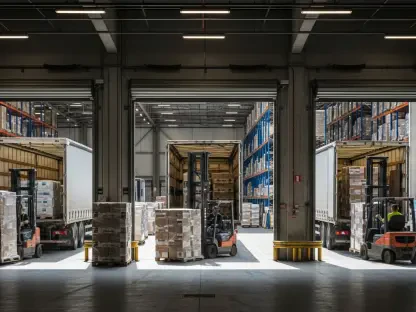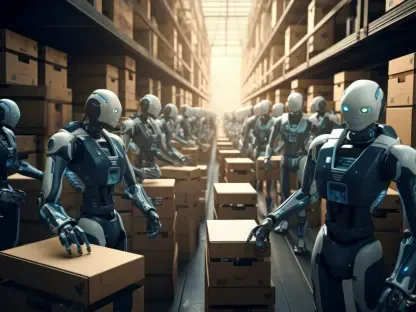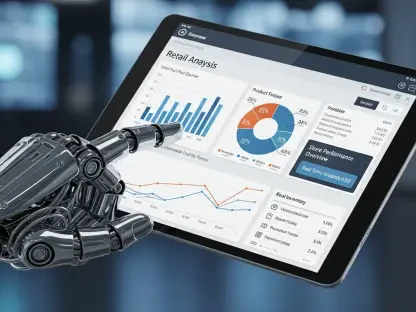In a world where artificial intelligence (AI) often sparks fears of widespread job displacement, a more optimistic vision is taking shape within the realm of supply chain management, promising a future where technology enhances human roles. By 2030, AI is expected to redefine the roles of supply chain professionals, not by eliminating their positions, but by enhancing their capabilities and influence. Contrary to narratives of automation leading to redundancy, this technology offers a pathway to offload repetitive, labor-intensive tasks, allowing planners to concentrate on strategic initiatives, creative solutions, and relationship-building. This shift promises to make supply chain jobs not only more impactful but also more rewarding. As industries brace for rapid technological advancements over the next few years, understanding how AI will augment rather than replace human expertise becomes critical. This article delves into the transformative potential of AI, exploring how it will reshape responsibilities, foster collaboration between humans and machines, and position supply chain professionals as indispensable drivers of innovation and resilience.
Automating the Mundane for Greater Impact
The integration of AI into supply chain management is already proving to be a game-changer by tackling the repetitive tasks that often bog down planners. Functions such as monitoring supplier delays, issuing alerts for operational hiccups, and processing extensive datasets in spreadsheets are increasingly handled by intelligent systems. This isn’t about reducing the workforce but about reallocating human energy to areas where it matters most. By automating these time-consuming duties, AI creates space for professionals to address complex challenges like mitigating risks and strengthening partnerships with vendors. The result is a workforce that can prioritize high-value contributions over routine grunt work, setting a foundation for more meaningful engagement in the supply chain ecosystem. As these tools continue to evolve, their ability to streamline operations will only grow, offering planners an unprecedented opportunity to focus on what truly drives progress.
Beyond just freeing up time, AI’s automation capabilities are reshaping the perception of supply chain roles as strategic assets rather than mere operational necessities. When mundane tasks are managed by technology, planners can dive deeper into analyzing trends, anticipating disruptions, and crafting proactive strategies to maintain flow and efficiency. This shift also means less burnout from endless data crunching or manual tracking, fostering a work environment where mental bandwidth is reserved for innovation. Additionally, as AI handles the bulk of transactional activities, it provides real-time insights that were previously unattainable without significant effort. Supply chain professionals can leverage these insights to make informed decisions swiftly, enhancing responsiveness in an industry where timing is often everything. This transition underscores a broader trend: technology isn’t a threat but a catalyst for elevating the human role to new heights of relevance and effectiveness.
Redefining Roles Through Strategic Leadership
As AI takes on operational burdens, the role of supply chain planners is evolving from reactive problem-solvers to strategic leaders who orchestrate both human and technological resources. By 2030, envision professionals overseeing arrays of AI agents tasked with demand prediction, inventory adjustments, and scenario modeling, while their primary focus shifts to validating outputs and aligning them with overarching business objectives. This meta-management approach transforms planners into conductors of a complex symphony, ensuring harmony between automated processes and organizational goals. It’s a departure from the constant firefighting of day-to-day issues, positioning these roles at the heart of long-term planning and resilience. The emphasis moves toward guiding outcomes rather than merely reacting to them, marking a significant leap in how supply chain expertise is applied.
This evolution also brings a renewed focus on integrating human insight with AI-driven precision to navigate an increasingly intricate landscape. Planners will not only manage systems but also interpret AI recommendations through the lens of contextual factors that technology might overlook, such as cultural nuances in supplier dealings or unexpected market shifts. Their role becomes one of synthesis—blending data-backed suggestions with intuitive judgment to craft strategies that are both innovative and practical. This strategic orchestration extends to fostering collaboration across departments, ensuring that AI’s contributions are seamlessly woven into broader business frameworks. As supply chain professionals adapt to this elevated position, they’ll find themselves indispensable in steering companies through volatility, using AI as a powerful ally to anticipate challenges and seize opportunities with confidence.
The Essential Human Touch in AI-Driven Systems
Despite the remarkable advancements in AI, including cutting-edge developments like Agentic AI that can reason and act independently, technology still falls short of replicating human judgment in supply chain contexts. Planners contribute irreplaceable qualities such as empathy, creativity, and a nuanced grasp of real-world intricacies that machines cannot match. For example, while an AI system might identify a potential inventory shortfall and propose a solution, only a human can weigh additional considerations like the impact on long-standing supplier relationships or geopolitical tensions before finalizing a decision. This synergy between AI’s analytical prowess and human discernment ensures that supply chain strategies remain balanced, ethical, and attuned to broader implications. The partnership highlights a fundamental truth: technology excels at processing, but people excel at prioritizing with purpose.
Moreover, human oversight acts as a critical safeguard against the limitations of AI, ensuring that automated decisions don’t veer into impractical or shortsighted territory. Planners provide the ethical framework and contextual awareness necessary to temper AI’s outputs, especially in scenarios involving sensitive trade-offs or stakeholder dynamics. This role extends to advocating for sustainable practices and aligning AI-driven initiatives with corporate values, areas where algorithms alone cannot lead. As supply chains become more interconnected and complex, the human ability to navigate ambiguity and foster trust will remain a cornerstone of effective management. By complementing AI’s speed and scalability with thoughtful decision-making, professionals ensure that technology serves as an enhancer of human intent rather than a standalone dictator of outcomes, preserving the integrity of the supply chain.
Seamless Decision-Making Through Integrated Systems
A forward-thinking trend on the horizon is Autonomous Concurrent Orchestration, where AI agents synchronize decisions across diverse supply chain functions like procurement, logistics, and manufacturing in real time. Unlike the current fragmented approach to automation, this method accounts for all variables simultaneously, optimizing trade-offs and accelerating resolutions through direct agent-to-agent communication. For supply chain planners, this translates to managing a more cohesive and efficient system, where the focus shifts from juggling disconnected processes to guiding a unified strategy. The technology promises to dismantle operational silos, enabling a level of integration that enhances visibility and responsiveness across the board. As this innovation unfolds by 2030, it will empower professionals to prioritize high-level oversight while AI handles the intricate coordination of day-to-day execution.
The impact of such real-time integration extends to improving how supply chains adapt to sudden disruptions or shifting demands. With AI agents communicating and adjusting autonomously, planners gain access to a dynamic framework that anticipates issues before they escalate, offering solutions that are both timely and comprehensive. This capability allows professionals to step back from micromanaging individual components and instead concentrate on long-term goals, such as building resilience against global uncertainties or advancing sustainability initiatives. The result is a supply chain that operates with unprecedented fluidity, where human input shapes the strategic direction while technology ensures seamless implementation. As this trend gains traction, it will redefine efficiency standards, positioning planners at the forefront of a more agile and interconnected industry landscape.
Empowering Planners as Architects of Technology
Supply chain professionals are not merely end-users of AI; they are poised to become active participants in its development and refinement. By curating data, training models, and providing iterative feedback, planners ensure that AI tools remain aligned with the practical realities of their field. This collaborative feedback loop between humans and technology is vital for creating systems that are not only powerful but also relevant to specific operational needs. Far from being passive recipients of automated solutions, planners emerge as innovators who tailor AI to address unique challenges, enhancing its utility over time. This role as co-creators underscores the importance of human expertise in shaping tools that amplify rather than dictate supply chain strategies, fostering a partnership that drives continuous improvement.
Additionally, this active involvement in AI development positions planners as key influencers in how technology evolves within their domain. By identifying gaps in AI performance or suggesting enhancements based on frontline experience, they help bridge the divide between theoretical algorithms and real-world application. This process also builds a deeper understanding of AI capabilities among professionals, enabling them to harness these tools more effectively in decision-making. As they refine systems to reflect dynamic market conditions or organizational priorities, planners contribute to a cycle of innovation that benefits the entire supply chain ecosystem. This dual role of user and architect ensures that technology remains a servant of human intent, adapting to the nuanced demands of an ever-changing industry while empowering those who guide its direction.
Building a Collaborative Future with AI
Reflecting on the journey of AI in supply chain management, it’s evident that past concerns about job replacement were met with a powerful counter-narrative of empowerment. Automation tackled the repetitive, while human ingenuity steered the strategic, creating a balanced partnership that redefined professional roles. By embracing technology as an ally, supply chain planners adapted to oversee intelligent systems, ensuring decisions aligned with ethical and business imperatives. Looking ahead, the next steps involve deepening this collaboration—investing in training to bridge skill gaps, fostering environments where AI and human insights coexist seamlessly, and prioritizing adaptability to keep pace with rapid advancements. Encouraging cross-functional integration and championing sustainable practices through AI-driven insights will further solidify the role of planners as indispensable leaders. As the industry moves toward 2030, the focus should remain on harnessing this synergy to build supply chains that are not only efficient but also resilient and forward-thinking.









